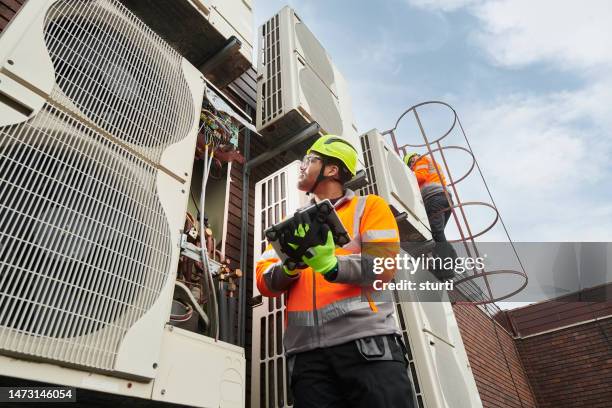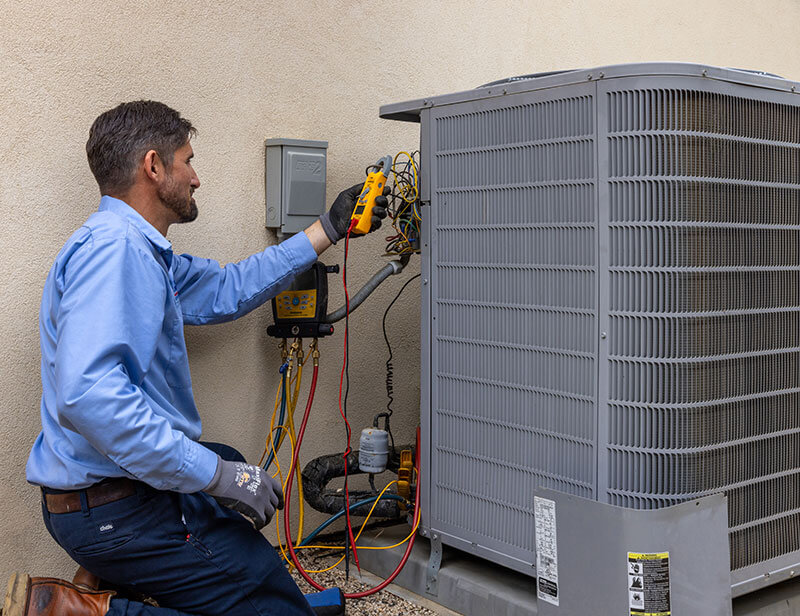Choosing the Right Time for furnace replacement
Choosing the Right Time for furnace replacement
Blog Article
Selecting Between a Warmth Pump and Heater: Secret Factors To Consider for Your HVAC Demands
When reviewing heating choices for cooling and heating needs, the decision between a heatpump and a furnace can be complex. Each system offers distinct advantages tailored to specific environments and power performance objectives. Recognizing these distinctions is essential for making an informed choice. Trick factors such as installment prices and ecological influence additionally make complex the choice process. Which option absolutely straightens with one's convenience and sustainability preferences? The complying with sections will check out these considerations in detail.
Understanding Warmth Pumps: Just How They Work and Their Benefits
While several home owners take into consideration numerous heating options, recognizing exactly how heatpump function and their benefits can substantially affect their decision. Heatpump operate by moving warm as opposed to producing it. In the winter season, they remove warm from the outdoors air or ground and transfer it inside, while in the summertime, they reverse this procedure, cooling the home by expelling warmth outside. This dual capability makes them flexible for year-round environment control.One of the primary advantages of heatpump is their energy performance. They utilize substantially much less electricity contrasted to typical heating unit, possibly leading to reduced energy bills (heat pump installation ooltewah tn). Furthermore, heatpump have a smaller carbon footprint, making them an ecologically pleasant choice. They likewise need less maintenance than traditional systems, adding to long-term cost savings. Generally, understanding the mechanics and advantages of warm pumps can aid homeowners make informed decisions regarding their heating and cooling down demands
Discovering Furnaces: Types, Operation, and Advantages
Heating systems are available in various kinds, consisting of gas, electric, and oil versions, each with unique operational devices. Understanding these differences is essential, as they influence performance and heating efficiency. Additionally, heating systems provide various advantages, such as regular warm output and integrity in cooler environments.
Kinds of Heaters
Heater can differ substantially in style and operation, with heating systems being a prominent option amongst property owners. There are a number of sorts of heaters, each using different fuel resources and technologies. Gas heating systems prevail, leveraging all-natural gas to produce heat efficiently. Electric furnaces, on the various other hand, make use of electrical resistance to create warmth, usually favored for their simple setup. Oil heaters, while much less usual, work in locations with restricted gas accessibility (heat pump service). Furthermore, condensing furnaces make the most of power performance by capturing and recycling exhaust gases. Each kind runs with a system of heat exchangers and ductwork to distribute warm air throughout a home. Comprehending the differences in between these heater kinds is essential for notified a/c decisions
Advantages of Furnaces
For house owners seeking trustworthy heat during cool months, the advantages of heating systems are considerable. Heaters offer consistent heating, guaranteeing even temperature levels throughout the home. They are particularly efficient in severe chilly, usually exceeding heatpump in freezing conditions. Different types, consisting of gas, electric, and oil furnaces, offer flexibility to satisfy diverse demands and preferences.Furnaces also tend to have lower initial setup expenses compared to warmth pumps, making them a much more obtainable option for numerous. Their robust design contributes to a longer life expectancy, with many units lasting over 15 years with proper maintenance. In addition, modern heating systems are usually outfitted with advanced technology for boosted effectiveness, which can lead to reduced energy costs. In general, heaters stay a dependable choice for effective home heating.

Energy Performance: Comparing Warm Pumps and Furnaces
When comparing power performance between warm pumps and heaters, the Seasonal Power Efficiency Ratio (SEER) plays a necessary function in identifying efficiency. In addition, an operational price evaluation exposes the lasting economic effects of each system. Comprehending these aspects can assist homeowners in making educated choices about their heating options.
Seasonal Energy Efficiency Ratio
Energy efficiency plays an essential role in the decision-making process in between heat pumps and furnaces, particularly when thinking about the Seasonal Energy Effectiveness Proportion (SEER) This statistics steps the cooling effectiveness of warmth pumps over an entire air conditioning period, offering a standardized method to review performance. Higher SEER scores show better energy performance, equating to lower energy consumption and reduced utility expenses. On the other hand, heating systems are commonly assessed making use of the Annual Fuel Use Effectiveness (AFUE) score, which shows home heating efficiency. When contrasting these 2 systems, property owners ought to focus on SEER rankings for warm pumps, as they directly impact overall power cost savings and environmental sustainability. An extensive understanding of SEER can significantly influence the long-term satisfaction and cost-effectiveness of the picked heating and cooling solution.
Functional Price Evaluation
Recognizing the functional prices related to heatpump and heating systems is essential for home owners reviewing their options. Warmth pumps normally supply higher power performance, transforming electric energy into warmth with minimal waste. This leads to reduced month-to-month utility costs, especially in moderate climates. Alternatively, conventional heating systems, specifically gas versions, may have lower in advance expenses but can incur greater functional costs over time due to fuel rates and efficiency ratings.Moreover, warmth pumps can function as both heating and cooling systems, possibly reducing the need for separate HVAC units. While preliminary investments for heatpump may be higher, their long-term cost savings in energy effectiveness can make them a more economical option for lots of houses. Mindful analysis of regional power prices is vital to establish the very best choice.
Installation Costs: What to Anticipate for every Home Heating System
Setup prices for home heating systems can vary substantially in between warm pumps and furnaces, affecting house owners' decisions. Heatpump usually have higher ahead of time setup expenses, generally varying from $3,500 to $8,000, depending on the system size and complexity of installation. This includes the outdoor device, indoor handling system, and necessary ductwork adjustments. Alternatively, heaters tend to have lower first costs, balancing in between $2,500 and $6,000, which can be appealing for budget-conscious house owners. Nonetheless, installment expenses can enhance if extensive ductwork is required.Moreover, the selection of fuel kind for heating systems-- natural gas, propane, or electric-- can likewise influence installation costs. While heatpump supply power effectiveness, their first financial investment might discourage some customers. Inevitably, reviewing installation expenses together with long-term savings and performance will help property owners in making educated decisions regarding their furnace.
Climate Considerations: Which System Performs Better in Your Area
Exactly how do environment problems affect the effectiveness of heating unit? The efficiency of heatpump and heating systems can differ significantly relying on the neighborhood environment. In modest climates, heatpump succeed by efficiently moving warmth from the outdoors air, making them an energy-saving choice. Nonetheless, their efficiency diminishes in extremely cold temperature levels, where they may have a hard time to remove i thought about this sufficient warm. On the other hand, heaters, specifically gas designs, offer trusted and regular heat no matter outdoor conditions, making them more effective in cooler regions.In locations that experience milder winters, warmth pumps can run effectively year-round, supplying both heating & cooling. In comparison, areas with extreme winters often gain from the toughness of heating systems. Ultimately, understanding the regional environment is important when determining between a warmth pump and a furnace, as it straight influences their operational efficiency and overall performance.
Maintenance Needs: Long-Term Treatment for Heat Pumps vs. Furnaces
While both warm pumps and heaters require regular maintenance to assure peak performance, their certain needs and care routines vary significantly. Furnaces commonly require much less constant attention, with yearly evaluations being adequate to look for gas leaks, tidy filters, and assess overall functionality. Their easier design typically enables simple repairs.In comparison, heatpump necessitate biannual upkeep because of their double duty in home heating and cooling. This consists of cleansing coils, checking cooling agent degrees, and making sure that both the outdoor and interior systems function at their finest. In addition, heatpump upkeep usually includes more intricate parts, making expert maintenance essential.Neglecting upkeep can bring about reduced effectiveness and raised power expenses for both systems. Inevitably, property owners should consider these lasting treatment requirements when picking in between a heat pump and a heating system, as positive maintenance can expand the life expectancy and efficiency of either system considerably.
Ecological Influence: Picking a Lasting Heating Alternative
The ecological impact of heating unit is an important analysis for home owners seeking lasting alternatives. Heatpump are usually more energy-efficient than typical heating systems, as they transfer warmth instead of create it, considerably lowering carbon exhausts. By using eco-friendly energy sources, such as air-source or geothermal heatpump, property owners can additionally reduce their eco-friendly footprint.On the other hand, gas heating systems discharge greenhouse gases and add to air contamination, though they frequently give greater heat result. Nevertheless, advancements in modern technology have led to the development of high-efficiency furnaces that reduce emissions.Ultimately, choosing a heating system includes evaluating performance versus ecological impact. House owners are urged to reflect on neighborhood energy resources and incentives for renewable systems, ensuring an option about his that lines up with both personal convenience and ecological responsibility. The choice affects not only immediate convenience but additionally lasting sustainability and environmental wellness.
Often Asked Questions
The Length Of Time Do Warmth Pumps and Furnaces Generally Last?
The life-span of warmth pumps usually varies from 15 to 20 years, while heating systems can last in between 15 to three decades. Routine maintenance considerably impacts their long life and performance in giving heating options.
Can I Use a Heat Pump in Very Cold Climates?
Warm pumps can run in very cold environments, however their efficiency reduces as temperatures drop. In such problems, supplementary home heating resources might be needed to maintain comfortable interior temperature levels and ensure peak efficiency.

What Is the Sound Level of Warm Pumps Versus Furnaces?
The sound degrees of heatpump and furnaces differ substantially. Typically, heatpump run more quietly than typical heaters, making them better for those conscious sound, while heating systems may generate louder operational noises throughout heating cycles.
Are Warmth Pumps Suitable for Both Heating and Cooling?
Warmth pumps are undoubtedly suitable for both cooling and wikipedia reference heating (heat pump service). They function by transferring warmth, providing efficient temperature control year-round, making them a flexible option for home owners looking for an all-in-one cooling and heating service
What Size Furnace Do I Required for My Home?
Determining the proper size heater for a home calls for evaluating factors such as square footage, insulation high quality, neighborhood environment, and the home's design. Consulting a specialist can guarantee a precise assessment and excellent convenience. Warmth pumps typically supply higher power performance, transforming electric energy right into warmth with marginal waste. In modest climates, warm pumps excel by successfully transferring warm from the outside air, making them an energy-saving alternative. Conversely, heating systems, particularly gas versions, provide reputable and constant heat regardless of exterior problems, making them better in cooler regions.In locations that experience milder winter seasons, warmth pumps can run successfully year-round, providing both heating and cooling. Warmth pumps are generally more energy-efficient than conventional heaters, as they move warm rather than produce it, substantially minimizing carbon emissions. By utilizing sustainable energy resources, such as geothermal or air-source warm pumps, property owners can even more reduce their eco-friendly footprint.On the various other hand, all-natural gas heaters produce greenhouse gases and contribute to air contamination, though they commonly offer greater warmth outcome.
Report this page